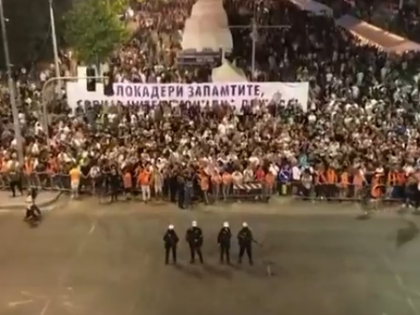Dozens clash with police in anti-government protests in Serbia
By IANS | Updated: June 29, 2025 11:03 IST2025-06-29T10:56:25+5:302025-06-29T11:03:59+5:30
Belgrade, June 29 Serbian police clashed with more than 140,000 protestors in Belgrade, marking one of the largest ...

Dozens clash with police in anti-government protests in Serbia
Belgrade, June 29 Serbian police clashed with more than 140,000 protestors in Belgrade, marking one of the largest demonstrations in recent months against President Aleksandar Vucic's 12-year rule.
The protestors, many of them students, flooded the capital, demanding early elections and an end to what they called an increasingly repressive populist regime, reports the BBC.
As protestors chanted, "We want elections," police responded with tear gas and stun grenades, leading to dozens of arrests. Scenes of chaos surfaced on social media as security forces tried to disperse the crowds.
"They wanted to topple Serbia, and they have failed," Vucic wrote on Instagram, accusing the protestors of attempting to "usurp" the country.
Meanwhile, the Higher Court in Belgrade confirmed that five individuals accused of plotting to overthrow the government were detained on Friday.
The police minister condemned the violence and affirmed that those responsible would be held accountable.
Despite the unrest, President Vucic has repeatedly rejected calls for snap elections. His ruling Progressive Party-led coalition currently controls 156 of the 250 seats in parliament.
The ongoing unrest has visibly shaken Vucic's administration, with university closures further aggravating the political tension. Although his second term runs until 2027, the sustained wave of protests has raised questions about his political future.
Vucic has maintained strong ties with both Russia and the European Union, even as Serbia remains a candidate for EU membership. Notably, Serbia has not joined Western sanctions against Moscow following Russia's invasion of Ukraine.
Critics continue to accuse Vucic's administration of links to organised crime, corruption, and suppression of dissent -- allegations the government denies.
The current wave of protests began in December last year, triggered by the collapse of Novi Sad railway station's roof on November 1, which killed 16 people.
The tragedy, widely blamed on corruption and poor infrastructure, led to the resignation of Serbia's former Prime Minister and became a lightning rod for public outrage.
As Saturday's protests concluded, organisers played a pre-recorded message urging Serbians to "take freedom into your own hands" and giving the crowd the "green light."
In a statement released on Instagram, protest leaders accused the government of choosing repression over dialogue.
"The authorities had all the mechanisms and all the time to meet the demands and prevent an escalation," the organisers said. "Instead, they opted for violence and repression against the people. Any radicalisation of the situation is their responsibility."
Disclaimer: This post has been auto-published from an agency feed without any modifications to the text and has not been reviewed by an editor
Open in app